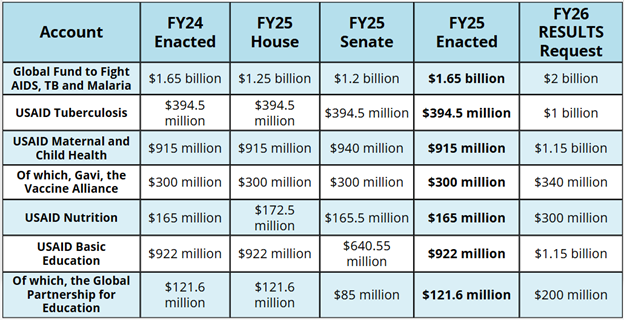Senate support for foreign aid in the Fiscal Year 2025 Continuing Resolution
Last Friday, 10 Democratic senators joined Republicans to pass a long-term continuing resolution (CR) for our current fiscal year (FY25). The CR means that we avoided a government shutdown. The government will remain funded through the end of FY25 in September. It also means that the long FY25 appropriations process is finally done. Now, Congress can focus on writing and passing regular Fiscal Year 2026 (FY26) appropriations bills, instead of another series of CRs.
Under the CR, last year’s funding levels (FY24 Enacted) will continue. This is likely the best-case scenario for the foreign policy accounts we advocate for every year. There were no cuts added to USAID global health and education programs, or the Global Fund to Fight AIDS, Tuberculosis and Malaria.
Your advocacy is helping to protect foreign aid

In another major win for foreign aid, a harmful amendment was struck down. Sen. Rand Paul (R-KY) introduced an amendment to reduce USAID funding in the CR. It forced senators to vote on USAID funding on the record for the first time this Congress. Seventy-three senators, including 26 Republicans, voted against cutting USAID funding. This is a great sign that your recent advocacy for protecting foreign aid has made a difference.
If your senator voted against the amendment, thank them and encourage them to also speak up publicly in support of USAID. They should also reach out to Secretary of State Rubio to demand the administration reverse the terminations of lifesaving global health and development programs.
Next steps: keep your members of Congress accountable
While maintaining FY24 funding is better than adding cuts, the CR has flaws. With inflation, FY24 levels will not be enough to fully maintain all global and domestic anti-poverty programs. In addition, the CR includes Republican partisan priorities. This includes $13 billion in cuts to non-defense spending, while increasing defense spending by $6 billion. It also forces the city of D.C. to cut their own annual budget that is funded by D.C. residents taxes, not federal taxes, by $1.1 billion. The Senate passed a separate bipartisan bill to fix the D.C. budget omission. But that bill faces an uncertain future in the House. It leaves D.C. with huge funding gaps in their annual budget for local schools, police force, and more.
A long-term CR comes with less oversight than a regular FY25 appropriations bill. So we need to follow up with Congress to ensure the funding they’ve appropriated is actually reaching the programs. We know that USAID funding still remains stopped by the administration. This goes against the will of Congress. Even programs that have been allowed to restart their work can’t access the funding they need. Congress must speak up and reassert their authority over foreign aid spending.
The final result of the FY25 appropriations process was largely positive for our issues. Congress will now move quickly to start FY26 appropriations. It’s a great sign that foreign aid funding was maintained this year. It must continue to be protected next year. Ask your members of Congress to submit our FY26 asks (see above) in their personal requests to the SFOPS subcommittee of appropriations. You can find leave-behind memos and cheat sheets for Member Appropriations Forms here. As the attacks on foreign aid continue, you can make a difference by educating your members of Congress on the devastating impact of dismantling USAID, and urging them to protect and increase funding levels for global health and education in FY26.